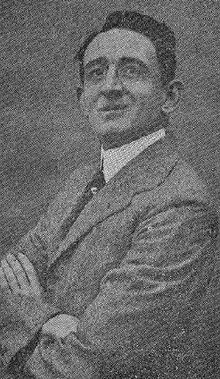Anthony Abbot
| Fulton Oursler | |
|---|---|
 |
|
| Born |
Charles Fulton Oursler January 22, 1893 Baltimore, Maryland, United States |
| Died | May 24, 1952 (aged 59) New York City, New York, United States |
| Nationality | American |
| Other names | Anthony Abbot (pen name), Fulton Oursler Sr. |
| Known for | The Greatest Story Ever Told (1949) |
| Spouse(s) | Rose Karger (divorced) Grace Perkins |
| Children | Fulton Oursler Jr., Will Oursler |
Charles Fulton Oursler, better known as Fulton Oursler, (January 22, 1893 – May 24, 1952) was an American journalist, playwright, editor and writer. Writing as Anthony Abbot, he was an author of mysteries and detective fiction. His son was the journalist and author Will Oursler (1913–1985).
Oursler was born and grew up in Baltimore, Maryland, the poor son of a city transit worker. His childhood passions were reading and stage magic. He was raised in a devout Baptist family, but at 15, he declared himself an agnostic. While still in his teens, he got a reporter's job for the Baltimore American.
Oursler moved to New York City to edit The Music Trades. He freelanced for a variety of publications early on. His short stories appeared in The Black Cat, Detective Story Magazine, The Thrill Book, and especially Mystery Magazine. Many of his stories, such as "The Magician Detective", incorporate magicians and magic into the plots.
In the 1920s, Oursler aided Harry Houdini in his crusade against fraudulent mediumship. He himself crusaded under the pseudonym Samri Frikell. He was the author of the book Spirit Mediums Exposed (1930), which revealed the techniques of fraud mediums.
John Mulholland wrote that Samri Frikell was the pen name of Oursler when he wrote on the subject of magic and spiritualism. He made it by combining the names of two magicians, Samri Baldwin and Wiljalba Frikell.
He was supervising editor of the various magazines and newspapers published by Bernarr Macfadden, from 1921 to 1941. Macfadden urged him to drop the "Charles" from his name. He became editor of Liberty after Macfadden acquired it in 1931. In the fall of 1939, Fulton Oursler, as editor of Liberty, printed a piece in his magazine called "Alcoholics and God," which brought a rush of 800 frantic inquiries into the New York office of Alcoholics Anonymous, as it was to be known.
...
Wikipedia
